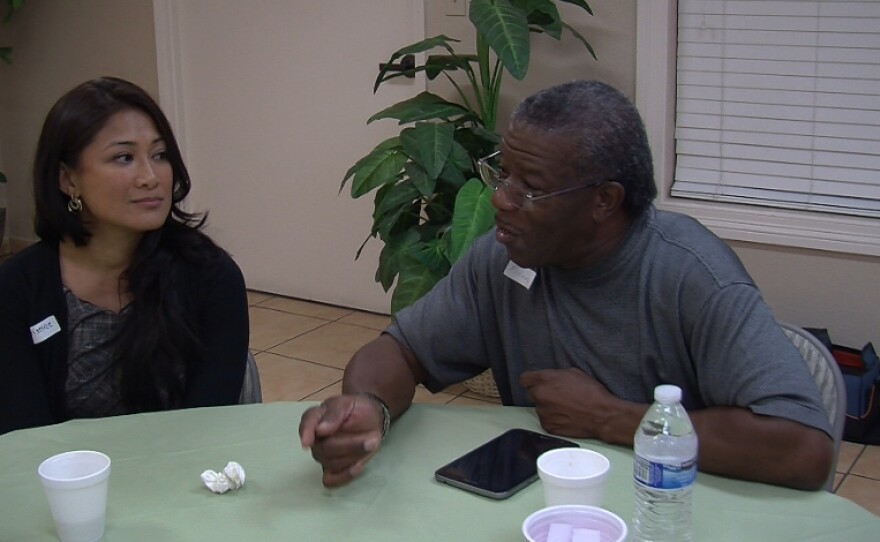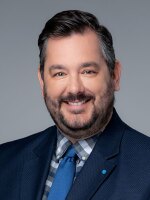ANCHOR INTRO: San Diego has more than a dozen Death Cafes, and if you think that sounds morbid, KPBS arts and culture reporter Beth Accomando says think again. TAG: On Dec. 15 Karen Van Dyke will be co-hosting the first Death Café for the San Diego LGBT community. When hosting a Death Café, Karen Van Dyke has an ice breaker she likes to use. KAREN VAN DYKE: When you talk about sex you don’t get pregnant, when you talk about death you do not die… Van Dyke hosted her first Death Cafe in May of last year. She says death can be off putting but pairing it with the idea of a cafe -– along with tea and cake offered at each meeting –makes it more palatable. KAREN VAN DYKE: Death wants to be heard and that’s what the Death Cafes are about. Letting death be heard and having that conversation with each other about that. Brian Grandon is senior minister at Unity of El Cajon, which describes itself as offering a positive, practical approach to spirituality. He provided the meeting space for last month’s Death Café. BRIAN GRANDON: It’s a comfortable place to come and dialogue about things that can be uncomfortable for a lot of people and have been taboo for generations in our western society. KAREN VAN DYKE: In this culture we are absolutely Death Phobic... No one is getting out alive, you might as well talk about the subject. The inspiration for the Death Café originated with Swiss sociologist Bernard Crettaz who created Café Mortel. Then John Underwood in London took the idea and transformed it into the Death Café in 2011. It’s not a physical space but rather events created so ideas can be discussed. Van Dyke says there are now more than 1000 Death Cafes in 23 different countries. KAREN VAN DYKE: The Death Café is a group of interesting, fun, curious people that come together to talk about death, dying and living over tea and cake and the objective of the conversation is to confront that we have a finite life and to live it well. Death Café is not alone in facing end of life issues. There’s also The Conversation Project and Death Over Dinner. Burton Disner attends Death Cafes as well as Hemlock Society meetings where you can learn about end of life choices. He says the people at a Death Café will break down into smaller groups at tables. BURTON DISNER: There’s a cup with about a dozen conversation starters in it you take one out and you look at it and read it and pass it around and each person comments on how they feel about whatever the questions is. MONTAGE (different voices reading questions): Do you believe in life after death?... What should you say to someone who’s dying?... What rites do you want performed at your funeral? KAREN VAN DYKE: A conversation starter can take you in a lot of different directions but we encourage people to bring their own questions as well… The beauty of the Death Cafe is that we are without agenda. It’s that mix of people and perspectives that brings the Death Café to such vivid ife says Brian Grandon. BRIAN GRANDON: The cool thing is that I sat next to an atheist and he’s thinks we’re fertilizer when we’re done here, that’s it, and… I love the authenticity of the dialogue. So everybody is accepted for where they are at and not expected to come into a common belief. KAREN VAN DYKE: Here’s an atheist, we’re here now, do it well and then it’s done and there’s some real value in that statement. Van Dyke says the Death Cafes in San Diego attract people mostly in the 45 to 65 age range, and a majority of women. Death Cafes offer a forum to discuss different perspectives as well as an opportunity to examine practical aspects of preparing for death. Burton Disner’s wife died 27 years ago from cancer. His experience with death changed his perspective on life. BURTON DISNER: Until you realize that you are not going to get out of here alive you are not going to enjoy life and that’s the whole idea. Enjoy life, we are only here a short time relatively and we got to enjoy life every day. As Monty Python said, always look on the bright side of life… or death. Beth Accomando, KPBS News. MUSIC: Always look on the bright side of life…
Movies About Death
“Here Comes Mr. Jordan” (1941)
“A Matter of Life and Death” (England, 1946)
“The Seventh Seal” (Sweden, 1957)
“Harold and Maude” (1971)
“All That Jazz” (1979)
“Monty Python’s The Meaning of Life” (England, 1983)
“Truly, Madly, Deeply” (England, 1990)
“Defending Your Life” (1991)
“The Sweet Hereafter” (Canada, 1997)
“A Taste of Cherry” (Iran, 1997)
“After Life” (Japan, 1998)
“My Life Without Me” (Canada, 2003)
“The Death of Mr. Lazarescu“ (Romania, 2005)
“Death at a Funeral” (England, 2007)
“Departures” (Japan, 2008)
“Up” (2009)
“Never Let Me Go” (England, 2010)
“The Descendants” (2011)
“50/50” (2011)
San Diego has more than a dozen Death Cafés, and if you think that sounds morbid, think again.
When hosting a Death Café, Karen Van Dyke has an ice breaker she likes to use: "When you talk about sex you don’t get pregnant, when you talk about death you do not die."
Van Dyke hosted her first Death Café in May of last year. She said death can be off putting but pairing it with the idea of a café — along with tea and cake offered at each meeting — makes it more palatable.
"Death wants to be heard and that’s what the Death Cafés are about. Letting death be heard and having that conversation with each other about that," she said.
Brian Grandon is senior minister at Unity of El Cajon, which describes itself as offering a positive, practical approach to spirituality. He provided the meeting space for last month’s Death Café.
"It’s a comfortable place to come and dialogue about things that can be uncomfortable for a lot of people and have been taboo for generations in our western society," Grandon said.
"In this culture we are absolutely death phobic... No one is getting out alive, you might as well talk about the subject," Van Dyke added.
The inspiration for the Death Café originated with Swiss sociologist Bernard Crettaz who created Café Mortel. Then Jon Underwood in London took the idea and transformed it into the Death Café in 2011. It’s not a physical space but rather events created so ideas can be discussed. Van Dyke said there are now more than 1,000 Death Cafés in 23 different countries.
"The Death Café is a group of interesting, fun, curious people that come together to talk about death, dying and living over tea and cake and the objective of the conversation is to confront that we have a finite life and to live it well," Van Dyke said.
Death Café is not alone in facing end of life issues. There’s also The Conversation Project and Death Over Dinner. Burton Disner attends Death Cafés, as well as Hemlock Society meetings where you can learn about end of life choices. He said the people at a Death Café will break down into smaller groups at tables.
"There’s a cup with about a dozen conversation starters in it, you take one out and you look at it and read it and pass it around and each person comments on how they feel about whatever the questions is," Disner stated.
Questions such as: Do you believe in life after death? What should you say to someone who’s dying? What rites do you want performed at your funeral?
"A conversation starter can take you in a lot of different directions but we encourage people to bring their own questions as well… The beauty of the Death Café is that we are without agenda," Van Dyke said.
It’s that mix of people and perspectives that brings the Death Café to such vivid life.
"The cool thing is that I sat next to an atheist and he thinks we’re fertilizer when we’re done here, that’s it," Grandon said. "And I love the authenticity of the dialogue. So everybody is accepted for where they are at and not expected to come into a common belief."
"The most interesting person was the atheist because I do believe there is life after and here’s an atheist, 'we’re here now, do it well and then it’s done,' and there's some real value in that statement," Van Dyke said.
Van Dyke said the Death Cafés in San Diego attract people mostly in the 45 to 65 age range with a majority of women. Death Cafés offer a forum to discuss different perspectives, as well as an opportunity to examine practical aspects of preparing for death.
"At the end of the Death Café one Saturday, this older gentleman came up to me and you could see this relief on his face and he said, 'My kids won’t talk to me about this and I want to, I have a 17 page document to go over with them.'" Van Dyke added, "And we have the opposite. Kids want to talk but parents don’t."
Burton Disner’s wife died 27 years ago. His experience with death changed his perspective on life: "Until you realize that you are not going to get out of here alive you are not going to enjoy life and that’s the whole idea. Enjoy life, we are only here a short time relatively and we got to enjoy life every day."
As Monty Python said, always look on the bright side of life — and death.
On Dec. 15 Karen Van Dyke will be co-hosting the first Death Café for the San Diego LGBT community.








